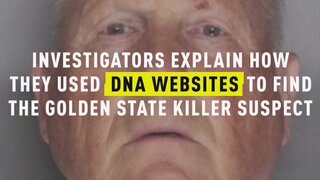Create a free profile to get unlimited access to exclusive videos, breaking news, sweepstakes, and more!
At Home DNA Testing Company Now Working With The FBI And Customers 'Feel Violated'
FamilyTreeDNA says it will help the FBI identify remains deceased persons or perpetrators of violent crimes.
A private genetic testing company has agreed to work with the FBI in an effort to solve crimes like murders, which may result in even more fears about privacy when it comes to uploading one's DNA.
Genetic genealogy helped crack the decades-old cold case of the infamous Golden State Killer last year, and ever since it’s been leading to arrests in other unsolved murders, low and high profile alike.
Up until now, only GEDMatch allowed for law enforcement usage. This week, though, FamilyTreeDNA announced that it's also on board.
In a press release released on Thursday, the direct-to-consumer DNA testing company announced that “after receiving inquiries from the FBI,” it decided that it could “in good conscience and without violating consumers' trust” help the FBI identify the remains of deceased persons or perpetrators of violent crimes.
"We came to the conclusion," Bennett Greenspan, president of FamilyTreeDNA, said in the press release, "that if law enforcement created accounts, with the same level of access to the database as the standard FamilyTreeDNA user, they would not be violating user privacy and confidentiality.”
The statement added that “in order for the FBI to obtain any additional information, they would have to provide a valid court-order such as a subpoena or search warrant."
It appears that it would work similarly to the relationship that genealogy website GEDmatch has with law enforcement. GEDmatch is used by genetic profiling labs like Parabon NanoLabs in conjunction with a law enforcement agency. Law enforcement will go down that route when they have DNA that hasn’t matched with anything in the local or in the national DNA database. That means it’s not a known offender, and their DNA hasn’t matched any of the suspects that's been checked.
GEDmatch only allows law enforcement to use its data to identify unidentified remains (those remains do not have to be someone who is the victim of a crime). When it comes to suspects, the crime must specifically be homicide or sexual assault.
Even though it was only one genealogy site that allowed law enforcement access, privacy concerns were still raised. Now, with this week’s news, concern is growing.
“All in all, I feel violated, I feel they have violated my trust as a customer,” Leah Larkin, a genetic genealogist who has used FamilyTreeDNA, told BuzzFeed News. “I’ve got to decide whether I want to opt out of matching or delete my kits.”
FamilyTreeDNA did state in its release that customers have the ability to opt out of the matching feature in their account settings, which means, according to the company, users wouldn’t be able to see their DNA matches nor can they be seen as a match by anyone else. That includes law enforcement.
“Opinions will be divided but this will lead to more victims getting justice, more victim's families getting answers, and getting predators off the street before they rape and/or kill again - this will save lives,” Investigator and DNA expert Paul Holes tweeted in response to the news.
It just may have solved the Golden State Killer case, after police took a DNA sample found at one of the Golden State Killer's crime scenes, a sample which sat in storage for decades, and ran it through GEDmatch. It matched with one of ex-cop Joseph DeAngelo's distant relatives and after additional steps, including Holes and his team creating multiple family trees, it led to the arrest of the man allegedly behind the serial killer spree.
[Photo: Associated Press]






























